Domi: Elbow on Niedermayer the ‘Dumbest Thing I Did in My Career’
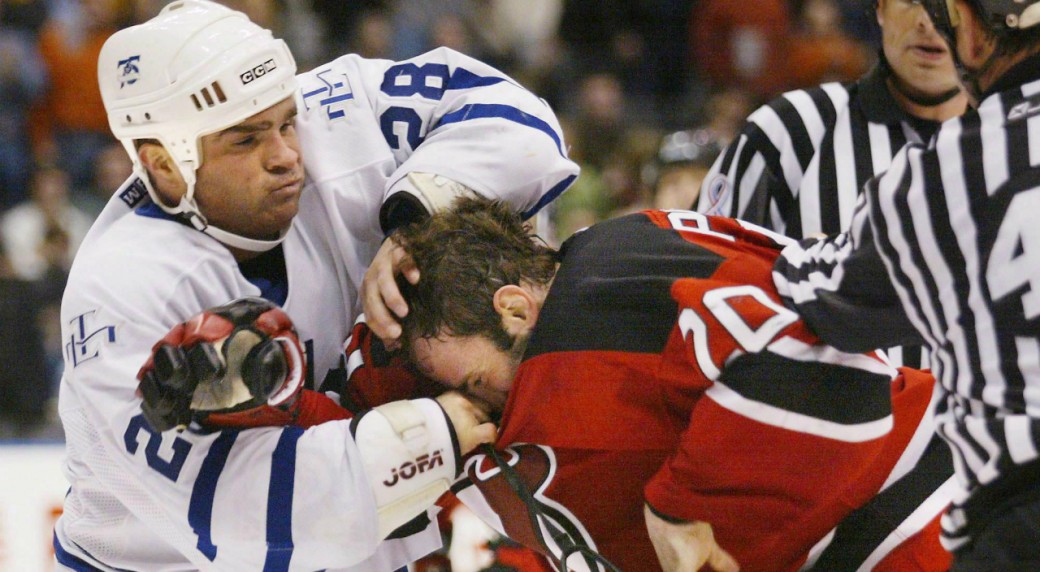
sportsnet.ca
TORONTO — The photos on the inside cover of Tie Domi’s “Shift Work” tell the book’s tale.
There are shots of family as well as stars like Mario Lemieux and Mark Wahlberg. But they are outnumbered by those showing Domi surrounded by firefighters, cabbies, police officers, construction workers and other everyday folk.
The former NHL tough guy values his real-life connections and what they stand for.
Domi, 46, said he turned down past requests to do a book because he didn’t want the focus to be on fighting. Instead he wanted to write a book dedicated to his late father, about positive life-lessons and old-school values like treating people how you want to be treated.
“If I was going to do a book, I wanted to make sure it was a book that I can actually put my name to and be proud of,” Domi said in an interview.
After 16 years, 1,118 games and 3,753 penalty minutes in the National Hockey League, Domi had no shortage of hockey stories. He says he fought a record 333 times during his NHL career.
“Not that I’m proud of it, but it is what it is,” he writes.
But when he decided to say yes to a book, he promised only headlines from his childhood, career and life after hockey.
There were other things he wanted to say.
“If you want to be a true leader and a decent person in this world you have to know the real people who do the hard work in life,” he writes. “That goes for business and everyday life as well as hockey.”
“If everyone would take the time to acknowledge people and get to know them and show them the basic common courtesy they deserve – even just a simple hello and goodbye – the world would be a much better place,” he adds. “Just remember that everyone is equal, on a hockey team and in life.”
He devotes an entire chapter, called “Keeping it Real,” to people he has met from other walks of life who have left an impression.
Domi, a 5-foot-10 fireplug who retired after the 2005-06 season, says he fought to protect his teammates during an in-your-face career that comes with some ugly highlights.
He calls the elbow smash to Scott Niedermayer’s head in the 2001 playoffs – payback for a Niedermayer stick to the face in an earlier game – “the dumbest thing I did in my career.” He was banned for the rest of the playoffs and the first eight games of the next season.
He voices fewer regrets about the infamous Ulf Samuelsson sucker-punch in 1995, although admits the ensuing eight-game suspension was warranted. The Rangers defenceman made the mistake of calling Domi, a dyslexic, a “dummy.”
Domi speaks highly of former Leafs coaches Pat Burns and Pat Quinn. He is not as complimentary about former GM John Ferguson Jr.
He does not dish on his 2006 divorce or highly publicized past relationship with Belinda Stronach, although family is clearly dear to him. But he does talk candidly about his business hits and misses.
Domi, whose circle of friends includes more than few entrepreneurs, says he was the first player in the NHL with a BlackBerry and would go over spreadsheets in his hotel room. But during the 2008 financial crash, he came home to find an eviction notice on his front door.
“I let my guard down and I trusted people that I shouldn’t have trusted,” he said.
He credits friend Mitch Goldhar, who built the first Walmart store in Canada in 1994, for helping him recover.
“He had told me to put my head down and my walls high. I really did that and the walls are really, really high,” Domi said. “I’m trying to teach my son (Arizona Coyotes rookie Max Domi) that now.”
Domi’s story – and message – seems to have struck a chord. “Shift Work” topped the bestsellers’ list in Canada.
“It’s a pretty cool, surreal feeling. It’s very humbling,” he said.
Well Read
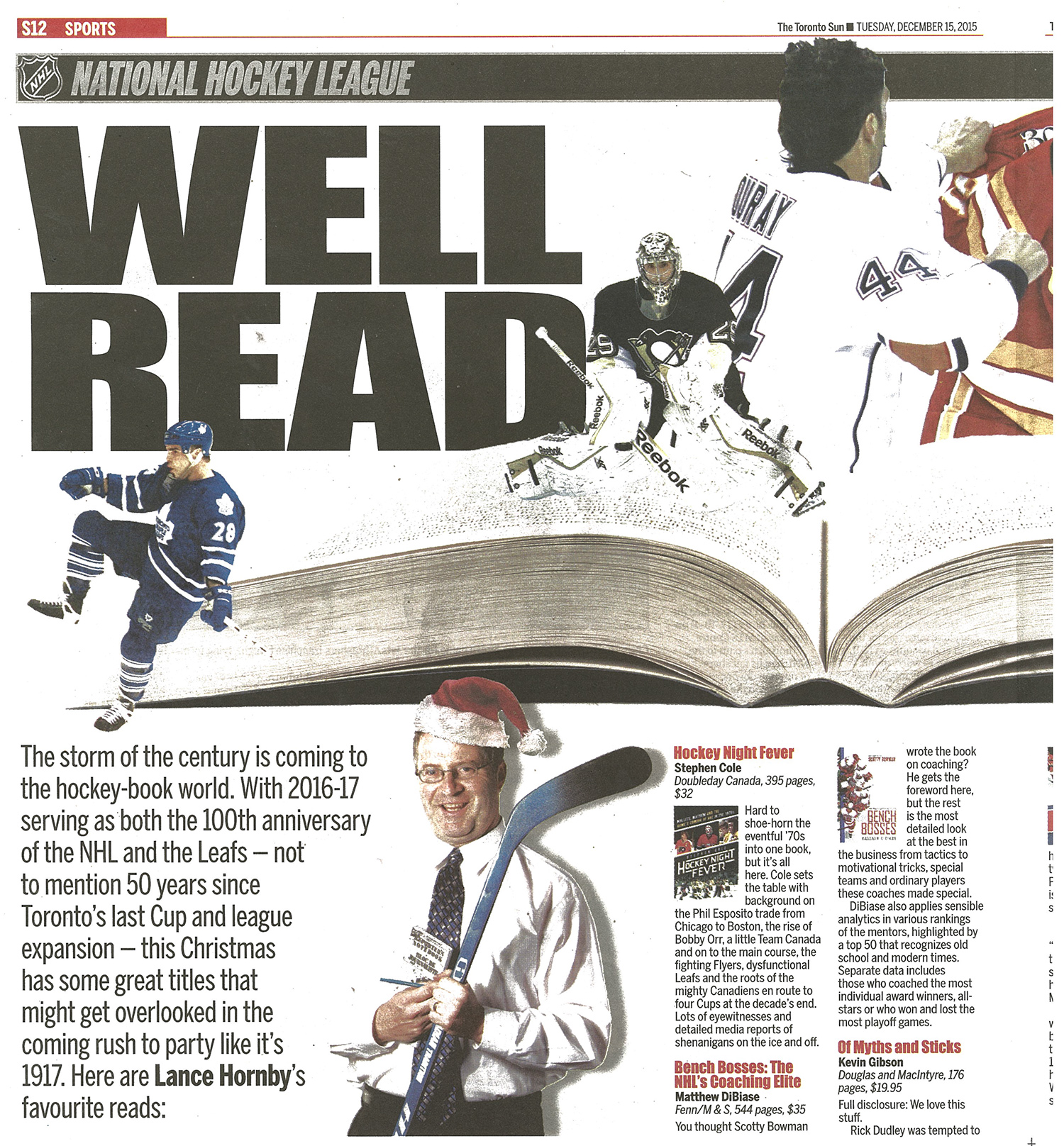
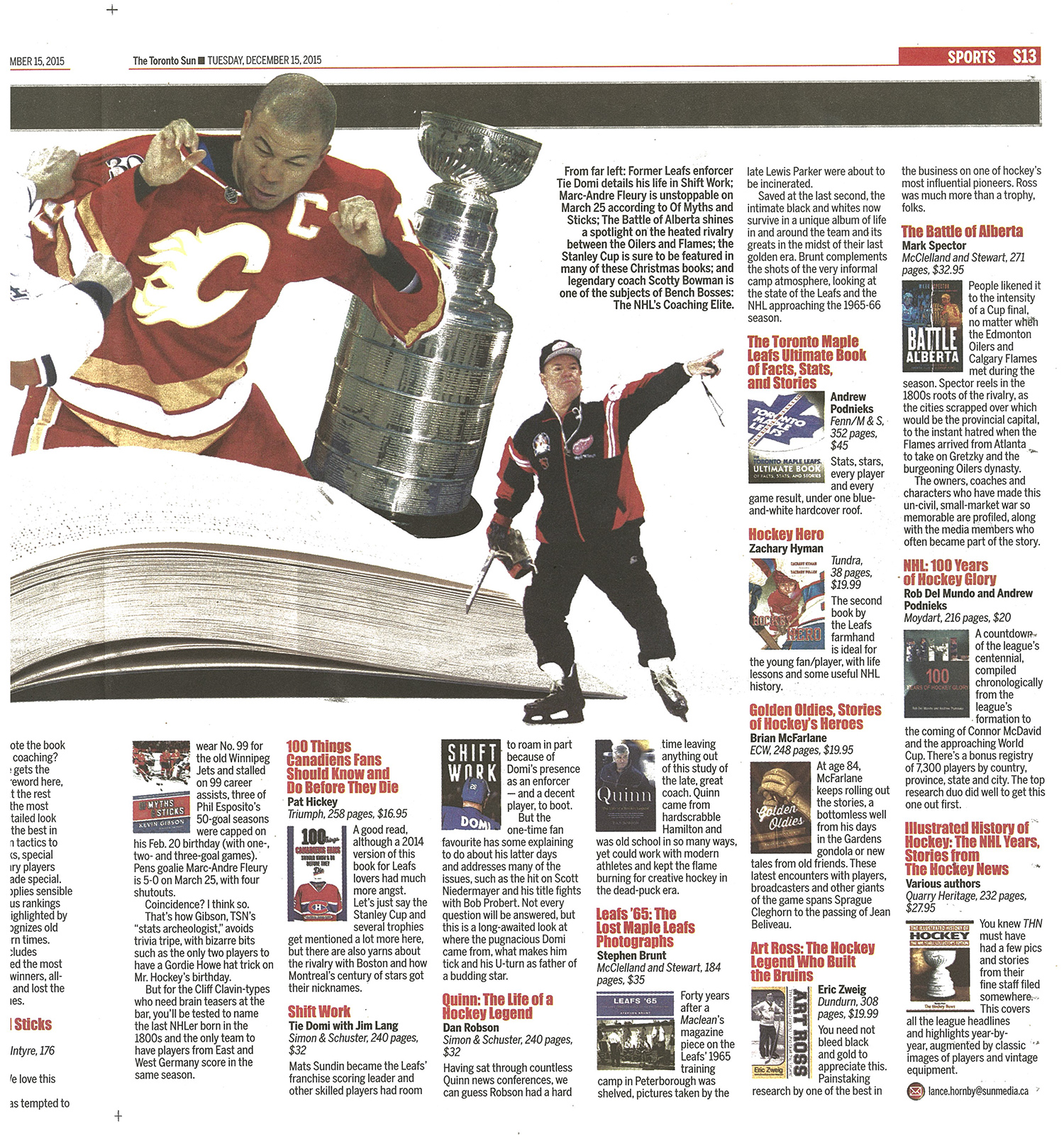
In Conversation With Tie Domi
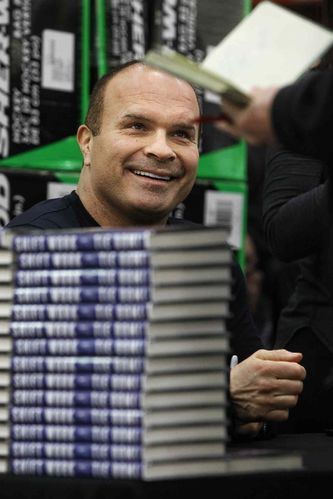
By: Geoff Kirbyson : winnipegfreepress.com
When Tie Domi was traded to Winnipeg just after Christmas in 1992, nobody was happier than Teemu Selanne.
The Finnish Flash was having a breakout season but didn’t have the muscle behind him that other snipers around the league, like Wayne Gretzky, did.
So, when the team gathered at the Rorie Street Marble Club after a game during the holidays, Domi could barely take a sip of his drink in between non-stop bear hugs from Selanne.
Tie Domi’s Memoir Details Bloody Story of the Battle of Ontario
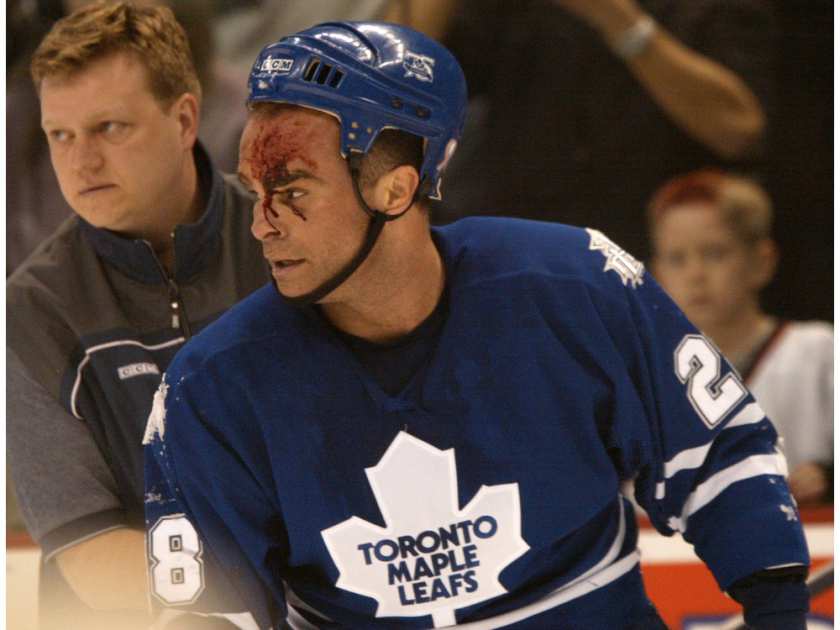
Peter Robb, Ottawa Citizen
Shift Work
Tie Domi (Simon & Schuster)
In Town: The author will be meeting fans and signing books at Kanata Costco Monday at 5 p.m.
Tie Domi was among a group of Maple Leafs who, more than the rest of the “blue team,” made losing the Battle of Ontario every spring in the first decade of this century a very bitter pill to swallow indeed.
These days he is the best-selling author of the memoir Shift Work, and the one-time hockey enforcer is telling the story of those years and much more, he says, the way he wanted to tell it.
Q&A: Tie Domi on his new book, fighting, and what matters in life
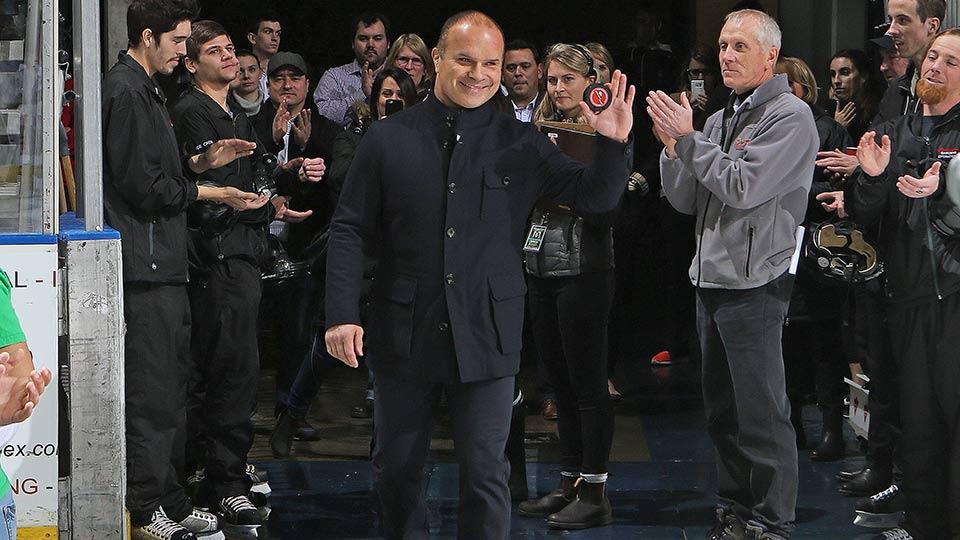
Former enforcer Tie Domi thinks he’s fought more than anybody ever: 333 bouts in the NHL. Those are on top of his countless preseason fights or the times he dropped his gloves in the minors and juniors. But he’s done talking about that part of his 16-year career with the Maple Leafs, Rangers and Jets. With his new book, Shift Work, Domi wanted to tell the story of his father, his son—Arizona Coyotes rookie star Max—and the everyday people who make life great. Domi recently chatted with SI.com about the state of fighting in hockey, respecting others, and the Biebs.
Jeremy Fuchs: Some fighters say they don’t respect a guy who won’t drop the gloves.
Tie Domi: To be honest with you, I was never expected to [fight] and nobody ever told me to. I did that for my team and my teammates. I protected Mike Ricci. I protected Mike Ricci in juniors, you know what I mean? I understood that whole thing when I was 14-15 years old and then [came] three years of junior, and then the minors, preseason games, playoffs and the street. That’s like 500 fights. I didn’t want to write about being the person who’s probably fought the most on the planet. I did it, and I wanted to be the best at it, and because of my size (5′ 10″, 213 pounds), I had to be smarter than anybody. I’m too small not to be sharper than the other guys. I was too small not to make sure I was sharp. That’s why I wasn’t a big partier or drinker, because I couldn’t afford to not be on my game. Because every single game I played in the NHL, I always had to be ready to go at any single time.

JF: There are a lot of guys nowadays who lay out big hits or do a lot of talking, agitating, and then don’t fight. Does that bother you? Does that speak to the lack of respect factor?
TD: It’s a different time and it’s a different era. We all know what we did in our era. We made everybody accountable. We policed the game ourselves, the best we could. When you see some reckless stuff against the best players, that’s where the league has gotten much better at protecting the players because it’s almost no tolerance. Like the Raffi Torres hit—you just gotta be aware of situations. The speed and the fact that guys are vulnerable.
I watched the last four years in junior hockey where my son played and he was the leading scorer, and he was targeted every single year from his first to his fourth. I’m in the stands watching this. It’s tough to watch. Juniors has a long way to go. They’re the ones that want fighting out of hockey. [NHL commissioner] Gary Bettman has never said he wants fighting out of hockey once. Junior hockey is where they say fighting, fighting, fighting. It is dangerous out there. Max’s first year, against Barrie, he got blindsided. Last year in the playoffs he gets blindsided, elbow right to the head. He was out the rest of playoffs. That’s how junior hockey [is].

JF: Some of the most poignant chapters in your book are about Bob Probert and Wade Belak. Unfortunately, we’ve seen a lot of guys struggle after their careers end. Do you think fighting, and the repeated hits to the head, played at least a part in their troubles? Are you concerned at all?
TD: That’s why I wrote this book. [But] I’m going forward. I don’t really talk about that stuff. I enjoy every day. I like to be around people I like to be around. Regardless of who I was, that’s the way I am. I put my walls high. The people I’m around now, you know who my friends are. They’re in the book. Normal guys. And that’s why they’re in there. That’s why Mark [Messier] is in there, Mario [Lemieux] is in there. They’re in there not because they’re my longtime friends, but they’re all humble stories. I’m trying to get that message across. Acknowledging, respecting, being humble, keep it real. Those are the messages.
JF: What are your old school values?
TD: Treating people how you want to be treated. That’s really the gist of what I wanted to do with the book. I really wanted to dedicate it to my father. I wanted one chapter for the everyday person. The parking lot lady at the Air Canada Centre, or the security guys or the Zamboni guys or the ice crew, those guys were like family when I played. When I go to the ACC, they treat me like their own family.
JF: You’ve outsold the Prime Minister [Justin Trudeau and his book Common Ground] …
TD: It’s life lessons and life values, dedicated to my father. I only would do a book if it was done my way. When you have guys like Mario Lemieux come to the Canada book launch and the New York book launch, and then A-Rod, Floyd Mayweather comes. Justin Bieber Instagrams me a picture. How does this all happen? I haven’t changed. Those guys are normal guys. Justin Bieber asked me if he could come to the game when Max played against the Islanders. He was into the game, very respectful, and very humble. These guys are real guys in the limelight.
MEET TIE DOMI & CELEBRATE HIS #1 BESTSELLER
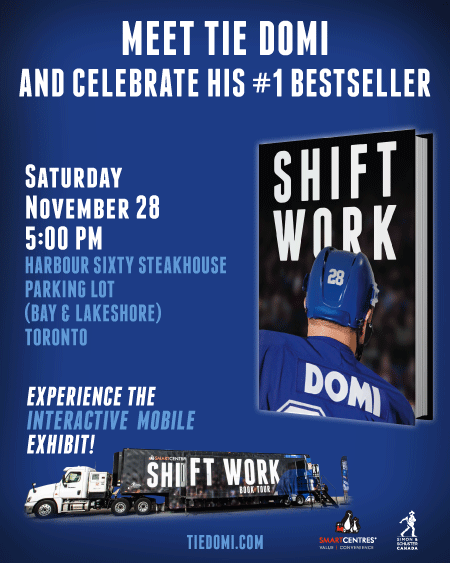
Tie Domi Moves From Penalty Box to Arena Suite, Watching His Son’s Blossoming Career

ALLAN KREDA – nytimes.com
Intensely watching his son Max battle the Islanders this week, Tie Domi was temporarily distracted when a fellow Canadian appeared in his Barclays Center suite.
After sharing a few hugs, that Canadian, Justin Bieber, and his entourage quickly took seats next to Domi, the former N.H.L. tough guy, their collective attention focused on No. 16 darting about the ice below wearing the white, red and black of the visiting Arizona Coyotes.
“Go, Max; take off, Max!” Domi urged his 20-year-old son, watching from a bar stool with the hands he had used in 333 N.H.L. fights folded quietly in front of him. “Let’s go, Max!”
NHL-er Tie Domi Celebrates Book Launch With A-Rod, Lemieux
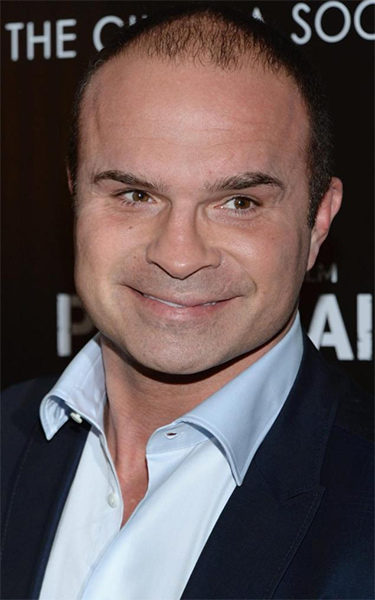
nydailynews.com
TIE CELEBRATES WITH A-LIST FRIENDS
NHL legend Tie Domi celebrated the launch of his book, “Shift Work” at the Four Seasons Hotel, where Nelson Peltz, Jeff Soffer, Bruce Beal, Alex Rodriguez, Mario Lemieux and Floyd Mayweather Jr. came to celebrate their pal.
Lemiuex was overheard calling Domi “the best teammate I never had” while Mark Wahlberg, one of Domi’s closeset pals, said they connected over their “extremely large head sizes.”
Former Maple Leafs tough guy Tie Domi hits Windsor Walmart
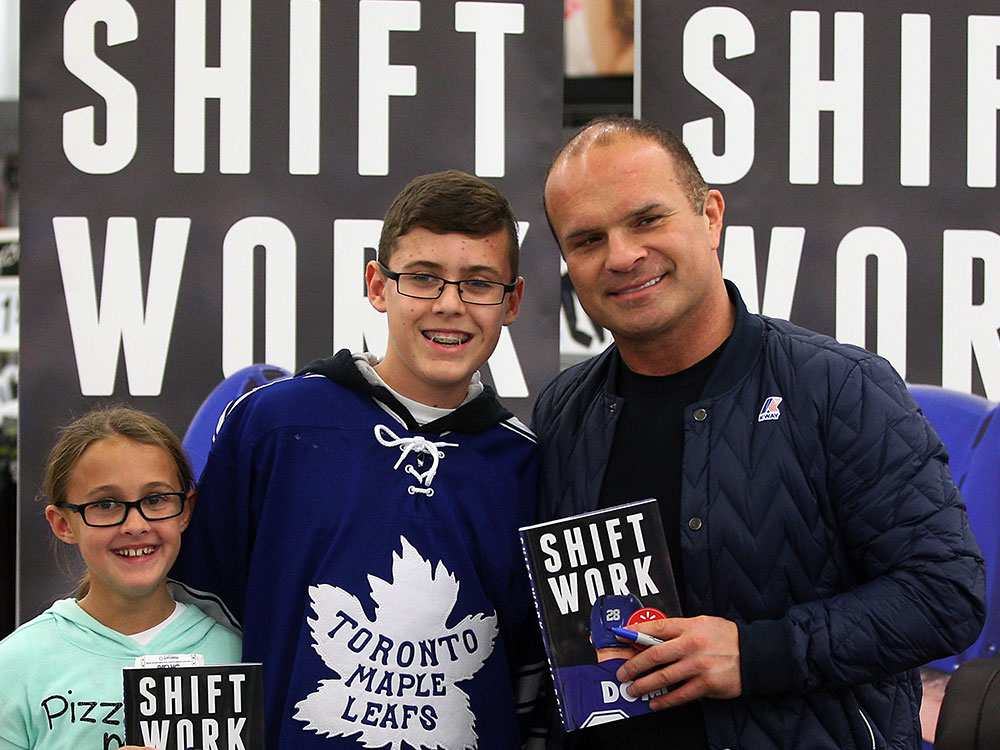
Nick Brancaccio – Windsor Star
Large crowds formed on Wednesday to see former Maple Leafs tough guy Tie Domi, who made a stop in Windsor to promote his newly released book Shift Work.
The Belle River native’s first book chronicles his life growing up as the son of immigrants to an NHL career that spanned 15 years.
Following the meet-and-greet, Domi took to Twitter to thank all the Windsorites who made it out to the launch.

You must be logged in to post a comment.